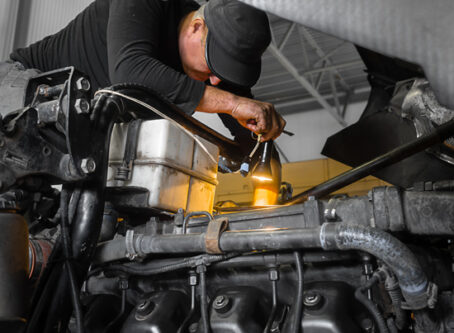More former Celadon execs indicted for securities fraud scandal
Two more Celadon executives have been indicted by the U.S. Securities and Exchange Commission for their alleged role in a fraud scheme worth tens of millions of dollars.
On Thursday, Dec. 5, the SEC filed a civil complaint against former Celadon Chief Operating Officer William Eric Meek, 39, and former Celadon Chief Financial Officer Bobby Lee Peavler, 40. The complaint accuses the two men of taking part of a “complex securities and accounting fraud scheme that resulted in a loss of more than $60 million in shareholder value,” according to a U.S. Department of Justice news release.
The scheme is the same one that involved former Celadon CEO Danny Ray Williams. Williams was indicted on both civil and criminal charges earlier this year for his role in the scheme.
Celadon executives’ truck swap scheme
From 2016, Celadon-owned Quality Companies owned hundreds of trucks that were overvalued on its books by tens of millions of dollars. Quality Companies was unable to find drivers interested in leasing certain trucks due to prior defects. Those defects had caused a significant fall in the trucks’ value. However, Meeks, Peavler and Williams failed to disclose the millions of dollars lost as a result of the diminished market value of these assets, the indictment alleges.
Rather, federal prosecutors say the high-ranking Celadon executives pursued a series of transactions designed to get rid of the trucks without publicly reporting the loss. The scheme involved Quality Companies trading hundreds of its older, less desirable trucks to a dealer in exchange for the dealer’s newer, more desirable trucks. Quality Companies then engaged in simultaneous “sales” and “purchases” of trucks with the dealer at inflated prices, which avoided disclosing the fact that the trucks were worth far less.
More specifically, the executives provided the dealership with a list of trucks Quality wanted to sell with the company’s overinflated book value for each truck. The dealership would then calculate how much the trucks were overvalued by then inflating its invoices to Quality Companies. The net effect was to create trades with values on both sides inflated by millions of dollars, according to the indictment.
In a span of three months in 2016. Quality Companies traded approximately 900 overvalued trucks for approximately 650 newer used trucks, according to court documents. Two emails reveal that the value of 862 Quality Companies trucks were inflated by more than $33 million. Two invoices from Quality Companies to the dealership totaled to approximately $43 million.
Settlements and indictments
In April, Celadon agreed to a $42.2 million settlement after the DOJ and SEC launched an investigation.
Celadon is required to pay full restitution to shareholder victims harmed as a result of the crimes. Furthermore, Celadon agreed to implement rigorous internal controls and cooperate fully with the DOJ’s ongoing investigation, including its investigation of individuals. Prosecution of the company for securities fraud will be deferred for an initial period of approximately five years to allow Celadon to demonstrate good conduct.
Shortly before the settlement was announced, the U.S. government filed a criminal information against Williams. On May 9, the SEC filed a civil complaint against Williams. On that same day, Williams pleaded guilty to the criminal charges.
In July, Williams reached an agreement with prosecutors for the civil case. Williams will pay civil penalties to be determined at a later date. Sentencing for the criminal charges is scheduled for Feb. 13, 2020.
Meek and Peavler were each charged with one count of conspiracy to commit wire fraud, bank fraud, and securities fraud; five counts of wire fraud; two counts of securities fraud; one count of conspiracy to make false statements to a public company’s accountants; and one count of making false statements to a public company’s accountants. Peavler was charged with two additional counts of making false statements to a public company’s accountants.
As of publication, neither Meek nor Peavler have entered a plea.









